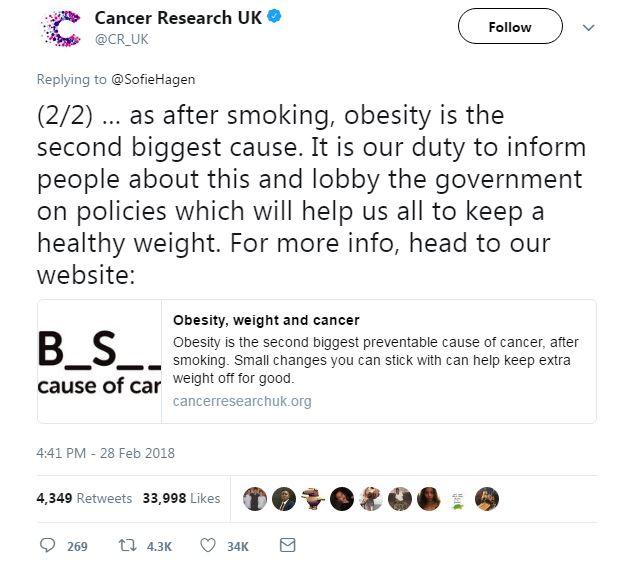Is it wrong to be blunt about obesity?
- Published

Comedian Sofie Hagen said Cancer Research UK's campaign was "incredibly damaging"
When Cancer Research this week revealed that millennials are set to become the most overweight generation since records began, there was a key message - after smoking, obesity is the second biggest cause of cancer.
It called for a ban on junk food advertising and urged people to eat healthier, more balanced diets.
But not everyone appreciated the tone of the message.
The award-winning Danish comedian Sofie Hagen, who lives in London and has written for the BBC about her social anxiety, took to Twitter to criticise the campaign, which she said was "incredibly damaging".
"Society viewing fatness as a negative thing is a thing that kills more than the cancer that you MIGHT get due to MAYBE something to do with you POSSIBLY weighing MORE than a CERTAIN weight POSSIBLY MAYBE," she wrote in a series of tweets.
So is it wrong to be blunt about the dangers of being overweight?
'The simplicity of weight'
Is "fatness" a bad thing?
While the health risks of obesity - such as increased risk of cancer and other diseases - are rarely disputed among most doctors, some experts and campaigners think the way weight is talked about should change.
Dr Stuart Flint, a senior research fellow in public health and obesity at Leeds Beckett University, said overweight people were routinely discriminated against and stigmatised - or "fat shamed" - in the media, school, the workplace and even by health professionals.

Cancer Research UK said it never intended to blame people for being overweight
This stigma makes them less likely to become healthier and puts them at increased risk of mental health and physical illnesses, he said.
He argues that the way people - including clinicians - view and talk about obesity "massively" needs to change.
"It's suggested to us that people can reduce their weight very quickly and that's clearly not the case," Dr Flint said.
"It's a chronic condition that takes place over many years."
Nick Finer, honorary clinical professor at University College London, said it was seen by many as "legitimate" to blame people for being overweight, but this ignored the role of the food environment around us.
He said: "If somebody falls off a boat into the water and they can't swim and they drown, nobody says 'it's your fault, you should have held your breath'.
"They happen to be in an environment where it's very easy to drown. We're in an environment now where it's very easy to over-acquire calories and energy."
'It has to be pointed out'
Some of these views are echoed in the body positive community - a movement that seeks to celebrate differences in body shapes and types and remove the stigma from being overweight.
Critics have accused the movement of "normalising" obesity.
But Dr Flint said this was wrong.
"It's not about normalising obesity or any other weight status.
"It's a matter of trying to reduce the potential physical or mental health concerns that are associated with body shaming and treating people in discriminating ways."
Tam Fry, spokesman for the National Obesity Forum, a charity that campaigns to raise awareness of the health dangers of obesity, agreed that body shaming was harmful and ineffective at getting people to lose weight.
But he said it was important that doctors should feel comfortable about telling people they are overweight.
He said: "Obesity is such an issue that it has to be pointed out to the person who is obese that they are obese.
"If they want to continue to be obese and are happy with it then so be it, but it has to be said.
"I think fat shaming is a disaster, but that is a different ball game from being told, quite sensibly, by people that you are obese and you have an uncertain future if you don't do something about it."
'Our duty to inform'
So was Cancer Research UK's message too blunt?
Dr Flint said he thought the campaign was "problematic" because it promoted the idea that individuals were to blame for obesity and that it was easily controllable.
"We know that obesity is caused by many factors. There are many different issues in society that contribute to the weight status. It's not about blaming the individual."
Mr Fry said Cancer Research was "absolutely right" to flag up the dangers of obesity.
Cancer Research said it never intended to blame people for being overweight.

In a two-tweet response to Ms Hagen that has been liked more than 30,000 times on Twitter, it said it did not want to make "anyone feel bad about their weight or make anyone think negatively about people who are overweight or obese" but had a "duty to inform" people about the link between cancer and obesity.
Prof Linda Bauld, Cancer Research UK's prevention expert, added: "This is not about fat-shaming. It is based on scientific evidence and designed to give important information to the public."
- Published26 February 2018

- Published8 March 2017
